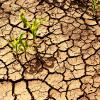
In a new study just published in the journal Nature Sustainability, an international team of scientists from the Earth Commission, convened by Future Earth, investigated the Earth system impacts of escaping poverty and achieving a dignified life for all. The research was inspired by discussions on potential trade-offs between achieving social and environmental goals.
In the study, the researchers asked what the additional pressures on the Earth system would be in 2018 if adequate minimum access to food, water, energy, and infrastructure was achieved. The authors looked beyond the international poverty line and instead defined ‘just access’ as minimum per capita requirements that would allow people to lead a dignified life and escape poverty. Their analysis showed an increase of pressures on the Earth’s natural systems, raising greenhouse gas emissions by 26% while raising water and land use, as well as nutrient pollution by 2-5%.
The authors conclude that redistributing resources and transforming society are key to ensuring universal access to basic needs while staying within the Earth’s limits. These transformations include redistribution and improvements to water, food, infrastructure, and energy provisioning systems.
The analysis also showed that pressures arising from the poorest third of humanity achieving adequate resource access, equaled the pressures caused by the wealthiest 1-4%. It provides scientific evidence that in order to achieve societal and environmental goals, it is the wealthy – who appropriate the bulk of Earth’s resources and ecosystems – rather than those escaping poverty who need to undergo transformative change. The authors therefore link the ‘Great Acceleration’ of rapid increases in human-driven environmental impacts with a ‘Great Inequality’.
“Many people assume that meeting the needs of the poorest is possible without major redistributions and transformations in society,” explains lead author, Crelis Rammelt, from Environmental Geography and Development Studies at the University of Amsterdam and Earth Commission expert. “It is, however, important to frame these potential impacts in the context of wider inequalities in resource use and environmental impacts today. It is the wealthy who appropriate the bulk of the Earth’s resources, not the poor.”
The research shows that in 2018 – so with 2018 levels of inequalities, technologies, and behaviors – providing dignified lives for the poor would have led to further crossing of Earth system boundaries, especially for climate. The aching poverty and inequality suffered by people in the Global South can nonetheless be addressed to provide a meaningful life for all, without transgressing key Earth system boundaries and thresholds.
"While it becomes clear that the poor are not causing the climate problem, it's also clear that we need to solve climate, to solve inequity. Climate impacts are hitting harder on those who lack the resources to cope with them, both internationally and within countries. When it comes to taking action, those who have more means to reduce dangerous greenhouse gas emissions also have a greater responsibility to do so. Stabilizing our climate is in their own interest, also because it means stabilizing societies," notes coauthor Johan Rockström, Co-Chair of the Earth Commission and Director of the Potsdam Institute for Climate Impact Research.
“The “Great Inequality” was amplified during the last decades so that ever more people are pushed into poverty. The paper clearly shows that eradication of poverty through just access to resources would not endanger the critical functions of the Earth system. However, over consumption by the affluent few could indeed lead to the tipping elements in the Earth system endangering the future of humanity. Sustainable lifestyles and sufficiency rather than overconsumption are the key to a safe and just future for all,” says Nebojsa Nakicenovic, a study coauthor and emeritus research scholar at IIASA.
While the paper focuses on only one aspect of justice – to ensure minimum access to resources and services for the most disadvantaged – it shows that with contemporary technology and approaches to production, minimum access cannot be met without reallocating resources, risks, and responsibilities without redistribution and transformation.
“It is clear that we need to reduce inequalities within and across countries in multiple dimensions related to human wellbeing. This is at the core of overcoming the climate crisis and the multitude of systemic and cascading risks. This research highlights the deep and diverse transformations we need to get started as soon as possible,” concludes coauthor Caroline Zimm, a researcher jointly associated with the IIASA Transformative Institutional and Social Solutions and Equity and Justice research groups.
This new research comes ahead of an associated Earth Commission report due out in early 2023 that will outline a range of ‘Earth System Boundaries’ to safeguard a stable and resilient planet and underpin the setting of science-based targets for businesses, cities, and governments. In upcoming work, the researchers will look at other aspects of justice, such as minimizing harm to humans and addressing the root causes of environmental degradation and vulnerability.
The Earth Commission is the scientific cornerstone of the Global Commons Alliance in which IIASA is a partner. Nebojsa Nakicenovic and Caroline Zimm are contributing to the Earth Commission’s work as well as the upcoming report.
Adapted from a press release prepared by the Earth Commission and Future Earth.
Reference
Rammelt, C.F., Gupta, J., Liverman, D., Scholtens, J., Ciobanu, D., Abrams, J.F., Bai, X., Gifford, L., et al. (2022). Impacts of meeting minimum access on critical earth systems amidst the Great Inequality. Nature Sustainability DOI: 10.1038/s41893-022-00995-5
News

14 June 2024
IIASA Leadership visits Washington DC

05 June 2024
The 2024 State of CDR Report: Scaling up CO2 removal to meet Paris Targets

25 April 2024
